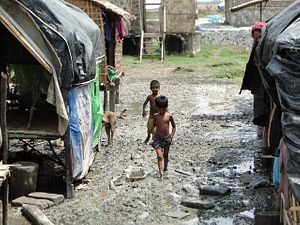Two months ago, the world was shocked to discover the persecution endured by the Rohingya ethnic group, which drove many of them to seek asylum in several Southeast Asian countries. The majority of the boat refugees came from Myanmar.
But the refugee problem could be worse. Consider these statistics provided by the United Nations High Commissioner for Refugees: Myanmar’s stateless people are estimated to number 810,000, most of them Rohingya, who are not recognized by the government. In 2012, violence in Rakhine State forced around 140,000 people, including the Rohingya, to flee their homes. Meanwhile, the number of internally displaced persons across the country has already reached 374,000. Refugees who are originally from Myanmar are pegged at 479,706, while those seeking asylum number 48,053. Temporary camps along the Thai border have been established for some 120,000 refugees from Myanmar.
The rising number of IDPs is alarming, especially in Kachin State and northern Shan State, with more than 100,000 IDPs already displaced and in need of continued humanitarian assistance.
The Kachin IDPs have been living in makeshift camps near the Chinese border ever since the resumption of hostilities between government soldiers and Kachin rebels four years ago. The Kachin struggle for independence sparked one of the longest civil wars in the world between 1961 and 1994. A ceasefire agreement was signed in 1994, lasted 17 years and was nullified only when clashes resumed in 2011.
Last week marked the fourth year of the civil war. It became an occasion for civil society groups and international aid organizations to highlight the plight of the IDPs and to call for a renewal of the peace talks.
Lahpai Seng Raw, co-founder of the Metta Development Foundation, which delivers assistance to many IDPs in Kachin, narrated the suffering of the IDPs: “Some have gone through multiple displacements, fleeing from one camp to another. Some who stayed close by to be able to go back and check on their homes, livestock and farms are in particular peril, as they are often caught in the crossfire of two warring armies.”
She also warned that aid reduction is worsening the conditions in the camps. “As the war enters its fourth year, the fatigue factor is settling in with donors, social organizations and host communities who have been looking after them for so long. Currently, the threat of food shortage is very real in IDP camps,” she said.
Mary Tawm, a Kachin aid worker of Wunpawng Ninghtoi, added that desperation is already prevalent in the camps: “There are some victims who do not want to live anymore because they have lost their loved ones. Many elderly persons and some others are suffering from mental trauma, they feel hopeless. The number of students who no longer want to continue their education has increased.”
Responding to these reports, 56 solidarity groups from around the world signed a joint statement urging the government to end the military offensives in north Myanmar and allow the unhindered humanitarian assistance to the IDPs. They also accused the government of duplicity, claiming that it “continues to use its rhetoric of peace and reform to invite donors and investors to continue to fund the peace talks and development projects” but refuses to withdraw troops from the ethnic areas.
The Rohingya boat refugee crisis has alerted the world to the failure of the Myanmar government to embark on a democratic transition while guaranteeing the rights of various ethnic groups. Meanwhile, the continued displacement of Kachin residents underscores the importance of pursuing the peace talks that have been initiated in the past. An immediate ceasefire is needed to give relief to affected residents. It is no solution to end the war but it can save lives by ending the suffering of those living in the camps.

































